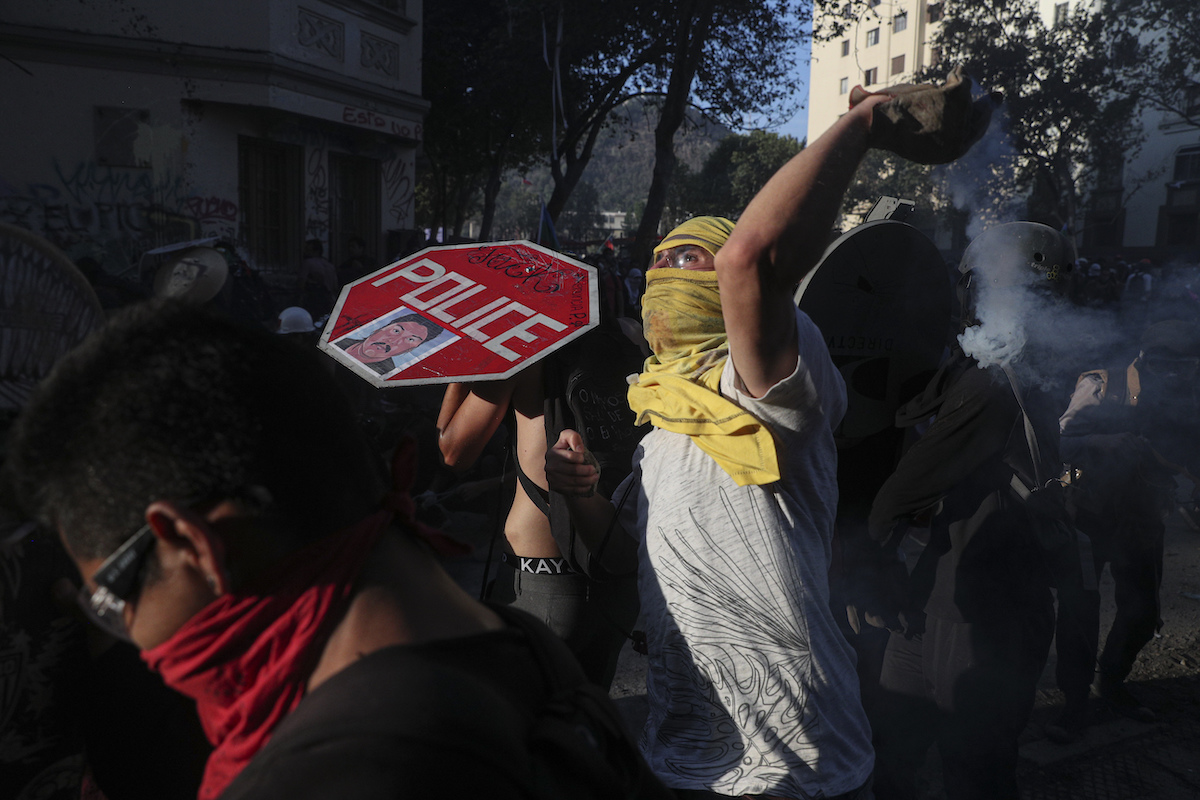

Anti-government protesters clash with police in Santiago, Chile, Monday, November 18, 2019. (AP Photo/Esteban Felix)
By CLAUDIA TORRENS, Associated Press
NEW YORK (AP) — Latin America has significantly reduced poverty over the last two decades. So why is there generalized discontent, prompting thousands of protesters to take to the streets?
A report from the U.N. Development Programme released Monday concluded it’s due to a new kind of inequality, no longer distinguished as much by income, but rather by the lack of equity, environmental development, and gaps in technology and education.
“Inequality in a context of economic growth, as there had been, generated aspirations that haven’t been satisfied,” Luis López-Calva, the UNDP’s director for Latin America and the Caribbean, said in an interview with the Associated Press. “Other manifestations of inequality are more evident, like segregation, lack of social mobility, not having a voice in politics.”
Latin America is the second most unequal region in the world, after sub-Saharan Africa, said López-Calva, despite the fact that poverty was halved in the quarter century through 2015.
The UNDP’s report, titled “Beyond income, beyond averages, beyond today: Inequalities in human development in the 21st century,” highlights that countries can’t focus on economic activity at any cost, but rather should concentrate on inclusive growth.
For example, countries with very high human development indices (HDI) have subscription to broadband services growing at a rate 15 times faster than that of countries with low HDI readings. Further, children of professionals in the U.S. hear three times as many words as those in families receiving welfare benefits, which affects performance on exams later in life.
“Policies to address it, therefore, must also start at or before birth, including investing in young children’s learning, health and nutrition,” the report says.
In recent weeks, countries like Chile, Colombia and Ecuador have seen massive demonstrations in their cities, with protesters railing against their governments’ inadequate responses to the population’s needs.
Bolivia is one of the countries that recently entered the UNDP’s group of countries with high human development, joining Peru, Ecuador, Colombia, Mexico and Brazil. Yet, when adjusting for inequality, all of them fell in the rankings, with the latter three countries plunging 16, 17 and 23 spots, respectively.
“Brazil’s snapshot of average income, education and health is even worse when we incorporate the distance between Brazilians on these things,” said Marcelo Neri, an economist who directs the social policy department at the Getulio Vargas Foundation university. “Brazil was the pioneer of big protests in 2013. In that sense, all of Brazil’s economic and now social decadence is a worrisome preview for our Latin neighbors.”
Argentina and Uruguay are in the UNDP’s category with very high human development along with Chile, which has the region’s highest ranking. However, adjusted for inequality indices, Chile ranks below Uruguay.
“The message there is that Chile has to worry more about inequality,” López-Calva said.
***
Associated Press writer David Biller contributed reporting from Rio de Janeiro.



maybe also how many kids you have. whether its a two income household. there are many factors which cause inequality